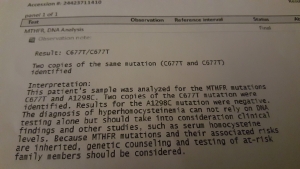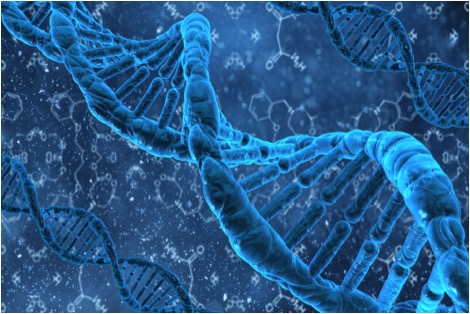So THIS happened…
and It’s a Real MTHFR
By Julie Williamson
Genetics are one strange bird. Take, for instance, how my mom – a gorgeous, brown-eyed redhead – and my tall, dark and handsome dad, also with snappy brown eyes, wound up with three blonde girls and only one with brown eyes (my older sis has blue and I have green). The whole dominant/recessive gene thing may not seem too perplexing if we recall our high school biology class days; however, some familial health issues, which are really nothing more than a “lucky” roll of the genetic dice, can be real head scratchers. And I must admit, some of this dice rolling hasn’t exactly had me shouting “YAHTZEE!” with enthusiastic delight.
Flip back the calendar to May 2012. My naturopath, who practices in a women’s health clinic in Mesa, Ariz., recommended I be tested for the MTHFR gene mutation. I had no idea what MTHFR was, but laughed at the lab write-up because those initials looked like teen-text for something crass). I also didn’t know what a mutation would mean (if my labs came back positive) but the way I saw it, if it would give me another piece to my puzzling health picture, I was definitely game. AND my trusty doc was the only one in a sea of physicians (MDs, NDs or otherwise) who’d been able to help me thus far, so I trusted her instincts.
 My results came back less than two weeks later: homozygous for the C677T MTHFR mutation (in other words, I had two copies of the same genetic mutation, which meant my mom and dad both had the MTHFR mutation and each passed along a copy to me – are those science lessons coming back to you now?). Since I’d picked up my lab results before my follow-up appointment with my doctor, I decided to do a little research on my own to see what my results meant. This statement on my lab paperwork told me the news wasn’t exactly to be taken lightly: Genetic counseling and testing of at-risk family members should be considered.
My results came back less than two weeks later: homozygous for the C677T MTHFR mutation (in other words, I had two copies of the same genetic mutation, which meant my mom and dad both had the MTHFR mutation and each passed along a copy to me – are those science lessons coming back to you now?). Since I’d picked up my lab results before my follow-up appointment with my doctor, I decided to do a little research on my own to see what my results meant. This statement on my lab paperwork told me the news wasn’t exactly to be taken lightly: Genetic counseling and testing of at-risk family members should be considered.
The lab results went on to explain in black and white (albeit, generically) MTHFR and the risks of my condition:
The MTHFR enzyme is responsible for creating the circulating form of folate. Folate is important in homocysteine regulation. Defects in the MTHFR enzyme can indirectly cause elevated homocysteine levels. The C677T mutation in the MTHFR gene can cause elevated homocysteine levels in individuals with insufficient folate, particularly when there are two mutations present (LUCKY ME!). Elevated serum homocysteine levels have been associated with an increased risk of cerebrovascular disease, coronary artery disease, myocardial infarction and venous thrombosis. In women, pregnancy complications and an increased risk of fetal open neural tube defects have also been reported.
JOY.
The more I dug into the research, the more alarmed (and simultaneously enlightened) I became. I spent hours with my nose buried in studies and journals and my fingers clicking through whatever expert websites I could find (www.mthfr.net – a website created by Ben Lynch, a naturopathic doctor dedicated to MTHFR awareness; www.dramyyasko.com, the website of Dr. Amy Yasko, an expert in biochemistry, molecular biology and biotechnology who is well versed on the methylation cycle and how it relates to the MTHFR mutation, and the knowledgeable Dr. Jill Carnahan (www.jillcarnhan.com) were three of my go-to online resources). Methylation, by the way, is hardly a footnote. Methylation is the process of a methyl group (comprised of a carbon and three hydrogens, in case you’re curious) attaching to an enzyme that performs a specific function. As Dr. Yasko notes on her website, methylation is involved in almost every biochemical reaction and contributes to a wide range of crucial bodily functions, including:
• Detoxification
• Immune function
• Maintaining DNA
• Energy production
• Mood balancing
• Controlling inflammation1
Those with the MTHFR mutation have diminished methylation function. In addition to the conditions listed on my lab report, research shows reduced methylation function can also contribute to cancer, diabetes, autism and spectrum disorders, chronic fatigue syndrome, Alzheimer’s disease, miscarriages, infertility and challenging pregnancies (interesting for me because I’ve been married 18 years and never became pregnant due to ‘unexplained infertility’), allergies (methylation is responsible for the breakdown of histamine. A-ha!), heavy metal toxicity (was diagnosed with that three years ago, incidentally), immune system and digestive problems (eureka!), and much more.2 Note: Although I’ve increased my awareness of MTHFR, methylation and how best to manage my homozygous C677T situation, I’m admittedly no expert. There’s a tremendous amount of science involved, and I recommend visiting the aforementioned websites for more in-depth explanations, management protocols and additional information.
So, here’s why I’m sharing my MTHFR story: if you happen to suffer from allergies/sensitivities that you’ve had trouble controlling, or any other of the above conditions (or, if you’re like me, you have a combination of symptoms) – or if you have immediate family members experiencing some of the symptoms — it may be wise to be tested for the MTHFR gene mutation (it’s not as uncommon as you might think). If a parent or sibling has already been determined to have the MTHFR gene mutation, it’s especially important to be tested. The test costs approximately $150, and in some cases, may be fully covered by insurance.
Although the mutation itself can’t be altered, it IS possible to assist the methylation process, improve your health and limit the risks associated with poor methylation [I take a number of supplements, including methylated (active forms) of B vitamins (avoiding folic acid, which those of us with MTHFR mutations have difficulty breaking down into methyl-folate, the active form of folate. This means ‘enriched’ foods, such as many cereals, store-bought breads, granola bars, cookies and the like, are off limits); exercise regularly; and do my best to eat a clean, unprocessed and balanced diet]. And I have noticed health improvements as a result (less anxiety, muscle pain and twitching, for starters). Again, all the above websites mentioned include protocols and supplements for managing MTHFR gene mutations. Not all families have the budget to allow for immediate testing, so if one parent or child tests positive for an MTHFR gene mutation, it may be wise for the entire family to at least adopt the dietary changes outlined on the doctors’ websites (cutting out enriched foods is a great place to start – and you’ll be healthier for it because ‘enriched’ foods, despite their friendly name, really don’t do our bodies and our health any favors. What this means is that food companies add nutrients back into their products after natural vitamins or minerals were stripped away during the manufacturing process).
After my MTHFR mutation diagnosis, my parents and two sisters were tested. Again, because I had two copies of the MTHFR C677T mutation, I automatically knew my mother and father were both carriers, but we wanted to get the full picture to help us (perhaps) explain some family health history, and determine the most effective protocol for managing our mutation(s). My mother and older sister were found to have one copy of the C677T mutation and one of the A1298C mutation (this is called “compound heterozygous”; the U.S. National Library of Medicine, a division of the National Institutes of Health, reports that there are at least 40 MTHFR mutations3, but C677T and A1298C are currently the two most heavily researched). My father came back with just one mutation (C677T), and my middle sister was unlucky like me with a homozygous C677T mutation [some experts consider this to be worst combination because C677T homozygotes have approximately a 70% reduction of normal MTHFR enzyme activity, compared to approximately a 30-40% reduction in those with one copy (heterozygotes)].
Interestingly, yet not surprising given the MTHFR data, my dad and two sisters have pretty significant vascular issues, and my father, sister and I both have elevated homocysteine and C-reactive protein levels (a marker for inflammation in the body). My mother, thankfully, hasn’t experienced as many symptoms, but she still practices due diligence (takes supplements, exercises daily and eat healthfully, overall). Sadly, with my mother’s two different MTHFR mutations (compound heterozygous), that means each of my maternal grandparents had at least one MTHFR mutation and their health histories fall in line with the associated risks; my grandfather, who outwardly appeared healthy, suffered several strokes — his first at the young age of 40 — and he passed away after a massive stroke in his early 80s. My maternal grandmother passed away at age 64 of ovarian cancer and also had vascular complications and other symptoms that could have been associated with the mutation. Because both passed away long before we’d ever heard of MTHFR, we’ll never know which one carried the C677T or A1298C mutation (or both), but it’s indeed possible that this mutation contributed to their medical conditions.
Since taking charge of my diagnosis, I feel more in control of my health and destiny, and am empowered in knowing that this mutation likely has contributed to my food allergies and sensitivities, and the laundry list of other health challenges I’ve faced much of my life. I’m also empowered by the fact that our DNA doesn’t need to become our destiny. Rather than bury my head in the sand in fear, I’ve taken charge and now realize that knowledge is power (my family has gotten on board, too – although it’s definitely a work in progress). The more we know, the more empowered we become to make wise decisions that can impact our health and future, and the lives of our loved ones.
Diagnoses can be scary, but I’ve learned that lack of knowledge and awareness is even scarier. Here’s to discovery…and adding another (potentially big!?) piece to my (and, perhaps, your) perplexing health puzzle.
References
- Yasko A. The Methylation Cycle: The Where, What’s and Why’s of Health Balance.
- Lynch B. MTHFR Mutations and the Conditions They Cause. Sept. 2011.
- U.S. National Library of Medicine. Genetics Home Reference. MTHFR.
For Further Reading







